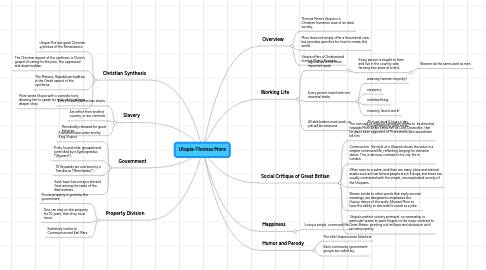Utopia-Thomas More
作者:Jazley Sendjaja


1. Christian Synthesis
1.1. Utopia-The last great Christian synthesis of the Renaissance
1.2. The Christian aspect of the synthesis is Christ's gospel of caring for the poor, the oppressed and downtrodden.
1.3. The Platonic, Republican tradition is the Greek aspect of the synthesis.
1.4. More wrote Utopia with a comedic tone, allowing him to speak his truth while telling a deeper story.
2. Property Division
2.1. Private property is given by the government.
2.2. One can stay on this property for 10 years, then they must move.
2.3. Extremely similar to Communism and Karl Marx.
3. Slavery
3.1. Every household has two slaves.
3.2. Are either from another country, or are criminals.
3.3. Periodically released for good behavior.
4. Government
4.1. Founded/ruled under and by King Utopos
4.2. Thirty households: grouped and controlled by a Syphograntus ("Styward").
4.3. 10 Stywards are overseen by a Traniborus ("Bencheater").
4.4. Each town has a mayor elected from among the ranks of the Bencheaters.
5. Overview
5.1. Thomas More's Utopia is a Christian-humanist view of an ideal society.
5.2. More does not simply offer a theoretical view, but provides specifics for how to create this world.
5.3. Utopia offers a Christianized form of Plato's Republic.
6. Humor and Parody
6.1. The title Utopia means Nowhere
6.2. Each community government groups are called sty.
7. Working Life
7.1. Agriculture is the most important work.
7.1.1. Every person is taught to farm and live in the country side, farming two years at a time.
7.1.1.1. Women do the same work as men.
7.2. Every person must learn one essential trade:
7.2.1. weaving (women majority)
7.2.2. carpentry
7.2.3. metalsmithing
7.2.4. masonry (stone work)
7.3. All able bodies must work, or job will be removed.
7.3.1. All must work 6 hours a day, though majority work more.
